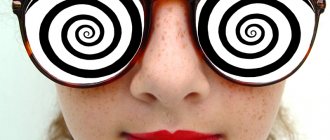Quick navigation: → Hypnosis: a simple definition → Self-hypnosis as the cause of panic attacks → Captured by illusions → How to make hypnosis work? → The effectiveness of hypnosis → Instead of a conclusion
"Hello! Do you treat panic attacks with hypnosis? Because only hypnosis will save me from panic attacks! Help!!!". This kind of beginning of a dialogue with future clients happens especially often. And it is this that makes me shudder every now and then.
No, don’t think about it, I’m not afraid of hypnosis and have a very positive attitude towards it. Moreover, he underwent extensive training in hypnotherapy, including from world luminaries. But I’m wary because there’s a difficult conversation ahead. And, perhaps, a certain “failure of hope” for the person who applied.
Yes, some disappointment cannot be avoided if expectations from hypnosis are far from reality. However, for those who are afraid of hypnotherapy, perhaps, on the contrary, a ray of hope for recovery will dawn. That’s why I conceived this article as a kind of educational program on hypnosis for people suffering from panic attacks and other symptoms of panic disorder (or, as it is fashionably called, VSD). So, let's begin!
Hypnosis: a simple definition
Remember the ancient story about the 3 blind wise men who tried to describe an elephant? The one who felt the leg stated: “An elephant resembles a stone column.” The one who got the tail was convinced that the animal looked like a rope. And the third, clutching his trunk, insisted that an elephant has a certain resemblance to a snake.
Each of them was right in his own way and at the same time wrong. The same goes for definitions of hypnosis. There are many of them, each of them is incomplete, although it emphasizes some important aspect. Which aspect will I emphasize? Perhaps the one that a hypnotic trance is a pause. A pause in activity and the hustle and bustle of everyday life, accompanied by a look within. Something in between full wakefulness and sleep. Meditation, daydreaming, reverie, or visualization exercises are all variations on the theme of trance, its variety.
Here's what else is important to understand about hypnosis and trance:
- The trance state is completely natural. It occurs several times a day for each of us. When you are riding the subway or sitting in public transport, look around! Many people are in the most ordinary trance: their eyes are closed, and if they are open, their gaze is unfocused, their body is relaxed. This state cannot be called sleep, but it cannot be called wakefulness either.
- All adjustments and changes in the body are easier to carry out at the moment of such a suspension of processes.
As you can see, nothing complicated, dangerous or unnatural. With only one exception (hint: take a closer look at the second point).
Female alcoholism is curable. Feedback from a patient after completing a course of hypnotherapy.
— Is it possible to code yourself in such a way that you can have a glass or two on the most important holidays and stop there?
— It is possible, but provided that the person has not yet become a chronic alcoholic. This measure is effective for those who are addicted only on a psychological level.
— Igor Ivanovich, the main method you use is hypnosis. Recently, the opinion has begun to spread that hypnotic influence on a person often causes negative side effects. Have similar “misfires” happened in your practice?
— Russian and foreign scientists conducted long-term observations of people subjected to hypnotic influence. It has been proven that the mental state of most of them is normal. The only exceptions were patients of unqualified, untrained doctors and people who suffered from mental illness before exposure. Therefore, we can state with confidence: hypnosis, carried out according to all the rules, is safe for health.
As numerous studies have shown, hypnosis does not produce side effects or complications if it is carried out by a qualified specialist who strictly adheres to all the necessary rules. Negative consequences arise only from dishonest work. Many coders, having treated a patient, subsequently do not bother to monitor his condition.
Many people do not need this, but there are also those who may have problems after encoding. They took away, say, a person’s opportunity to relieve stress with alcohol every day, and in return they did not give anything new. As a result, the patient experiences irritability, depression, and decreased performance.
If he remains left to his own devices, alone with mental anguish, then in a few years he may become seriously ill. To prevent this from happening, those who have any problems after coding should definitely have 2-3 support sessions with a psychotherapist. As for me and my colleagues working with me, after we have carried out treatment, we are interested in the future fate of the patient and always help if necessary.
— What treatment methods, besides hypnosis, do you offer patients?
— By primary education, I am a neurologist. I am proficient in manual therapy and acupuncture. As a rule, when working with a patient, I use a complex technique. My employees work with me - qualified psychiatrists, psychologists, sex therapists, herbalists, experienced specialists with academic degrees.
Self-hypnosis as a cause of panic attacks
So, in a state of trance, our ability to control our body increases. And a person who is a master of “self-tuning” will gain a lot of good from the limitless opportunities for self-improvement that open before him. But the skills of self-hypnosis among most representatives of modern Western civilization are at the “childish” level.
To understand the dramatic nature of the situation, I recommend a harmful experiment. Try to sit your child down at your computer for an hour or two and give him complete freedom... See what happens to your documents, programs, operating system - nothing good!
This behavior is the main cause of panic attacks! As a rule, it is impressionable, suggestible people who are susceptible to panic disorder (and agoraphobia). Absolutely spontaneously, without realizing it, they easily plunge themselves into a hypnotic trance and easily increase the heart rate, increase and decrease blood pressure, cause nausea, shortness of breath, etc. In a word, they create complete disgrace, like a tank in a china shop.
Taking a closer look at the tentacles of neurosis, it is easy to notice that they are controlled by special adjustment buttons. They can be controlled!
Lyrical digression. If someone thinks that suggestion is when a person tirelessly repeats af, “I feel good,” then he is mistaken. Everything is much more subtle. You can repeat these phrases like a parrot from morning to evening, and not notice how the opposite is actually being suggested.
Uncontrolled self-hypnosis, “bad” self-hypnosis is the reason that a person with a healthy heart, healthy thyroid gland and spine shakes and turns out, as if a heart attack is about to occur. The key word here is "uncontrollable", a person prone to panic attacks always feels unable to control his body with his mind and, indeed, is unable to do so properly. Moreover, each new panic attack, and in fact a new unsuccessful session of self-hypnosis, consistently increases internal helplessness. Therefore, if the problem is not treated, it tends to get worse, as there are more and more harmful self-hypnosis.
Treatment of insomnia
Hypnosis is often an effective treatment for those who suffer from insomnia. Hypnosis can help a person relax, both mentally and physically, using various relaxation techniques. Hypnotherapy can also help a person understand some of the causes of insomnia and sleep problems.
Many people who suffer from insomnia believe that they cannot sleep, and this is often why they do not sleep. Hypnosis can help you gain confidence in getting a good night's sleep.
Chronic insomnia can lead to other medical conditions such as depression and alcohol or drug abuse.
Kuznetsov Denis Vladimirovichpsychologist of the highest category, hypnotherapist, medical psychologist - HypnoLIFE
Duration
from 1 to 2 hours
Number of sessions
from 1 to 5
Session cost
from 5,000 to 10,000 ₽
We'll refund your money
If there is no result
Special offer! 10% discount on first appointment until the end of the month. Make an appointment
Captive of illusions
Hypnosis as a panacea
A person suffering from panic attacks intuitively guesses, especially after receiving successful test results, that the source of the “disease” is the head, that is, the nervous system, the psyche. Accordingly, it is the psyche that needs to be treated, not the heart and blood vessels. And of course, everyone has heard about hypnosis as a good means of influencing the psyche, including for the treatment of various mental illnesses.
I heard something, but from where? Mainly from feature films and television shows. There, the hypnologist acts as a kind of “psychosurgeon,” and a hypnotherapy session is similar to an operation under anesthesia, where the patient sleeps like a baby. Staring unblinkingly at the patient like a boa constrictor at a rabbit, the therapist first “puts the hypnotized person to sleep.” Then, in such a slightly scary, afterlife voice, he says, like a spell, something like: “You will wake up healthy, you will feel good, you will forget about fear...”, and blah blah blah...
Next, according to the standard scenario, the patient opens his eyes and... Oh, miracle! He is healthy and happy! At the same time, the “strength” and exceptional “hypnosis” abilities of the hypnotherapist are unobtrusively emphasized.
What's wrong here? All! Everything is turned inside out.
Firstly, the tandem metaphor - a patient completely passed out and a doctor who is poking around in the psyche - is terribly harmful. The patient is meant here to be completely deprived of control over the process of changing his psyche. He does not know and does not understand (because he is sleeping) what the psychotherapist is doing with him. If a person undergoes such a procedure in reality, the consequences will be dire: after all, with his behavior, the psychotherapist will only strengthen the harmful attitude about the patient’s helplessness in front of his native psyche, and therefore provoke the occurrence of panic attacks.
A striking example of such manipulations is A. Kashpirovsky with his famous: “I give instructions!” []. Perhaps this is good as a show, but it has little to do with treatment. Doctors remember well how hospital wards were overcrowded, exactly after sessions of mass hypnosis.
This should also include the myth about the personal “power” and “magnetism” of the hypnotherapist. “Do you know hypnosis?” - how often do I hear this question on the phone! We have to explain to the person that hypnosis is not some mysterious “psychic” ability of a doctor, but just a skill that can be learned. And, they say, you will cope with the violation thanks to your own resources, and I will help you with this. Moreover, treatment of panic attacks will be successful if you learn to “hypnotize” yourself by gaining reliable access to the source of these very resources. A doctor who insists on his exceptional hypnotic power is a charlatan.
I guess I’m somehow unconvincingly voicing my thoughts, because many callers still continue to search for a “strong personality” who can handle hypnosis.
Hypnosis is evil
There are 2 categories of clients who are afraid of hypnosis like fire:
- Patients whose main symptom of panic attacks is derealization, dizziness or “bad” obsessive thoughts. There is nothing surprising here: more than anything else, such people fear losing control or, alternatively, going crazy. And any trance-like state seems to be the beginning of the end to an alarmed consciousness. It is noteworthy that it is for them that hypnosis treatment will be especially effective (if they manage to overcome their fear, which is quite strong, by the way).
- All the same “victims of television”. They had seen movies of people under hypnosis carrying out vile commands from evildoers. Or how victims of hypnosis did not come out of a trance after the end of the hypnotic session or went crazy... I almost forgot: priests! That's who else is spreading stories about the “demonic essence” of hypnotherapy! It's a pity. Good trance work would help many sufferers to forget about panic crises forever and live happily. Prayers for panic attacks are darkness!
Sorcerers, magicians, psychics - understandable... But why psychotherapists!?
Instilling in a person some nasty thing that contradicts his moral principles is unrealistic. It is equally impossible to “go into hypnosis and not come out.” In general, if anyone doesn’t know, a powerful element of self-control is always preserved in a trance state. We are talking about the so-called “guard area” of the cerebral cortex, which always remains active and is vigilant about safety, including so that the mentioned moral principles are not violated [].
A certain reasonable amount of vigilance, of course, will not hurt. Your humble servant, at various hypnotherapy courses, has seen many traumatized individuals who, in an attempt to assert themselves, came to “master hypnosis.” Yes, the theory and practice of hypnosis attracts people with mental disorders.
But the point here is not that everything connected with the word hypnosis should be cut down at the root and the hypnologist should be forbidden to set foot on the threshold of the church. You just need to follow the basic rules of psychological hygiene. You won't lend all your savings to the first person you meet, will you? Don't give it! Because there is a risk that this person will turn out to be greedy, evil and unscrupulous. It's the same with hypnosis. The body is well protected from unauthorized intervention, but panic attacks should be treated with hypnosis by a good, kind and reliable person, a professional in his field.
Hypnosis against alcohol addiction. The plot of the talk show “Medicine”.
Regressive anti-alcohol hypnotic suggestion
Hypnologist Igor Ivanovich Razygraev conducts a session of regressive hypnotic suggestion against alcoholism
“My 17-year-old daughter had a mental breakdown. The desire to live disappeared; she tried to commit suicide several times. She was treated by various specialists, prescribed injections and pills, but her condition only worsened - her daughter ended up in a psychiatric hospital. With my last hope, I turned to Igor Ivanovich Razygraev for help.
“I drank heavily for two years. My health deteriorated sharply, sometimes I even ended up in intensive care, but I couldn’t stop. After three sessions with Dr. Razygraev, I completely gave up my terrible addiction. The condition is magnificent, I want to live, live! I'm happy. Tararaeva N.A.”
“As a child, I suffered from meningitis and subsequently suffered traumatic brain injuries twice. Every day I suffered from severe headaches, and I was almost constantly in severe depression. The medications that doctors prescribed for me did not help. After the first session with Razygraev, my depression completely went away.
Treatment of alcoholism using hypnosuggestion methods (hypnosis) - an article from the collection of scientific works "Problems of modern narcology and psychiatry in Russia and abroad"
How to make hypnosis work?
Therapy for panic attacks will be successful if you and your psychologist manage to solve 4 problems:
- Somehow curb your unpredictable and frightening dives into trance. Please note that you should not guard around the clock in order to prevent the trance state from being fired by a cannon. If you do this, then your life will turn into an unsuccessful struggle with what is stronger, and eternal pre-trance sensations of the dereal type will be ensured. It’s like trying to overcome the feeling of hunger through volitional efforts: it won’t work, it’s easier to eat your fill. As I said, trance occurs naturally in a person several times a day. And one must not avoid it, but allow it to BE in order to study it.
- Learn to promptly and effectively stop the pathological process of “winding up”. However, it is important not to overdo it. Sometimes self-winding is not a sign of illness, but an attempt by the unconscious mind to convey something important to consciousness. You need to measure seven times before cutting once.
- Learn to listen and hear the body, the signals of your unconscious mind.
Learn to make the right suggestions.
If you suffer from panic disorder, then rest assured that in the previous months all you did was “learn bad things.” They ignored, tried to bribe, forced, exploited, in a word, they behaved like a conqueror in relation to their native organism. And you don’t need to pound “positive attitudes” into your brain every morning, getting out of bed like a sledgehammer. These are not correct suggestions. You might as well start the day by suggesting that you are a bell. But you know that this is not so! Healing hypnosis has nothing to do with mechanical driving in nails, but is based on the deepest respect, trust and sensitivity to oneself, to the deep wisdom of the unconscious.
And, please note, you do everything described above for yourself. I emphasize: it is not the psychotherapist who performs some miracle of healing on you. No. If you are planning to treat panic attacks or agoraphobia with hypnosis, you must remember the motto:
Healing. Inside. Me. (Yes, you, dear reader!)
And you must find it! Why do you need a hypnotherapist then, you ask? Well... It’s like a catalyst: with the help of an experienced specialist, the path to victory over panic neurosis is more comfortable, easier, and shorter.
Why are there such different reviews about coding?
After reading these reviews, so different and unexpected, you can’t help but wonder why this is so. It's difficult to answer unambiguously. In some cases, perhaps the patient himself was not ready for treatment. In other cases, which cannot be excluded, a clinic was chosen in which such a service is not provided at the proper level, and, therefore, the effectiveness of treatment could not be high.
Experts who choose hypnosis as the main means of treating alcoholism are making a mistake. In addition to the fact that hypnosis is simply not effective, it can lead to mental disorders. Mental disorders (aggression, emotional instability or stiffness, depression, irritability, etc.
Usually those people who successfully overcome alcohol addiction are those who take their time and carefully study coding methods, their advantages, disadvantages and, of course, reviews. Failure awaits those who foolishly waste time on this.
If you have decided to overcome alcohol addiction with the help of coding, take the choice of an organization or a specific specialist seriously. Take the time to thoroughly familiarize yourself with the coding techniques that are offered to you! Also pay attention to reviews and draw appropriate conclusions!
The effectiveness of hypnosis
The effectiveness of hypnotherapy for panic attacks is determined by 2 factors:
- The professionalism of a psychotherapist. To get an idea of the specialist, you will have to do careful work, in particular, study customer reviews about the effectiveness of treating panic attacks with hypnosis. Unfortunately, reviews are easy to falsify. I don’t know about you, but I can feel when they are “fake”.
- Your trance abilities (your trust, openness, readiness for change and other components of successful hypnosis).
In order to get rid of the problem, you only need 1 session. But the person must be fully prepared to receive this session. And for such readiness to arise, months of training may be required. Alas!
That is why those who believe in the invincible “power of hypnosis” are in for an unpleasant surprise. To recover from panic attacks, you will have to work hard for a certain time. How many? Less than you fear, but more than you hope. Blitzkrieg - healing in one meeting - is a rare phenomenon. And there are no exceptions to this rule. Even the brilliant hypnotherapist of the 20th century, Milton Erickson, sometimes had to work hard for six months or more to prepare patients for victory over pathology (according to Betty Alice Erickson, his daughter) [].
How do I determine the degree of readiness? The easiest way to do this is through personal contact. There are many parameters. Here, as an example, is a frequently repeated situation. During a diagnostic interview, the client insists, “I want you to treat my panic attacks with hypnosis ONLY.” Now a question for you, reader, how ready do you think a man is for quick hypnotherapy?
My answer: not ready. Judge for yourself. He suffers so much from his anxiety that he internally does not trust anyone or anything, closes himself off and tries to control literally everything, including the psychotherapist. Overcontrol is a behavioral pattern that exhausts a person, causing stress and additional crises. Therefore, it is not clear whose request it is to use only hypnosis - the client’s or his neurosis?
Therefore, in this case, there is preparatory explanatory work to be done; one must also first teach the person to trust and relax. It is difficult to predict how long this will take... It may turn out that it is easier and more environmentally friendly to use other worthy methods of psychotherapy for PA. Which is what I often do.
Still, hypnosis is an effective method of treating panic attacks. But if the applicant is not internally ready, then training, trance training is necessary, sometimes long-term. And so that the therapist does not suspect you of anything, voice your request something like this: “I want to cure panic disorder, please use all the most effective things in your arsenal.”
Causes of insomnia
There are a number of reasons why people may suffer from insomnia:
- Disturbances in sleep conditions, such as noise, light, snoring or partner movements.
- Physical conditions that cause pain, discomfort, including arthritis, flushing, cold feet, and headaches.
- Loss or anxiety, such as bereavement, worries about work, worries about not being able to sleep, or family problems.
- Mental health problems such as depression or anxiety.
- Alcohol, caffeine, antidepressants and other medications.
- Big changes such as moving, new job or going to university.
Rules for immersion in hypnosis for neurotic conditions
So, usually the patient is asked to fix his gaze directly on a certain luminous point; the hypnotherapist can also speak in a calm and monotonous voice, and sometimes uses light music or a certain set of words.
Afterwards the client falls into a trance and the therapy session begins. There is no specific dive time. The duration of sessions is also set individually. For example, if a person is already experiencing quite serious mental changes, then, undoubtedly, a specialist can prescribe several sessions at once.
By using the widest possibilities of modern psychotherapeutic techniques in a competent combination directly with hypnosis-trance, you can achieve excellent results in the near future. Psychotherapy with hypnosis is relatively quick. This helps the client to read and process the information stored in the unconscious regarding his mental trauma, and also helps to find the optimal solution, quickly optimize all the processes that occur in the body and approach healing.











